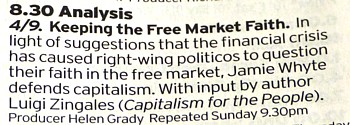We are developing the social individualist meta-context for the future. From the very serious to the extremely frivolous... lets see what is on the mind of the Samizdata people.
Samizdata, derived from Samizdat /n. - a system of clandestine publication of banned literature in the USSR [Russ.,= self-publishing house]
|
A command economy is kind of like using steroids: Yes, your national biceps get bigger, which looks impressive, but at the same time your national testicles are shrinking.
– Glenn Reynolds applauds the success of President Obama’s more private sector orientated space policies.
I have loved David Thompson’s Friday ephemera postings ever since they started, and the latest list contains something I especially enjoyed finding out about.
You wouldn’t think it would be possible to make the bicycle an order of magnitude more simple, but it would appear that the bicymple is just that. Instead of that big triangular bicycle frame in the middle, they just have a single strut across the top. The wheels are as near to each other as they can be without bumping into each other. The pedals of the bicymple are attached to the middle of the back wheel, which gets rid of the chain.
Unridable? Well, here is a video of a guy riding it. And here is an interview with the inventor.
The world is full of bizarre transport gadgets that “work”, in the merely mechanical sense, but which nobody seems to want to use for anything other than pratting about in pointlessly. So, whether the bicymple will ever catch on in a significant way is anybody’s guess. My guess is a definite maybe. I will sit decisively on the fence, and wait to see what happens with this strange little contraption.
All I can say with certainty is that I am looking forward to reading any guesses about the possible future of this bizarre gizmo that our often very tech-savvy commentariat feels inclined to offer.
Azhar Ahmed has not been sent to prison for expressing his offensive opinions on Facebook, but he has been sentenced to 240 hours community service and fined £300.
I protest.
Azhar Ahmed’s “crime” was saying on Facebook that he hoped that soldiers fighting for Britain in Afghanistan would “burn in hell”.
This was clearly not an incitement to violence. Azhar Ahmed was merely expressing the wish that Allah should inflict violence. Azhar Ahmed is not himself planning to burn anybody in hell, nor is he inciting any other particular individuals to burn anybody in hell.
I think this is a perfect opportunity for all those of us who believe in the right of individuals to say offensive things to protest vehemently on Azhar Ahmed’s behalf, and to tell him and anyone else listening that he should not have been legally punished in any way for what he merely said. There is an important principle at stake here, and this is a truly excellent moment for many, many people who agree about this principle to say so.
It is also a perfect opportunity for us all to say other offensive things that we each happen to believe in, thereby doing the old “I’m Spartacus” trick. In that spirit, let me now say some other offensive things that I happen to believe in, and which I also believe to be pertinent to this argument.
I hate Islam. Not just “Islamic extremism”. Islam. I agreed with Osama Bin Laden about very little, but I did and I do agree with him about what Islam says and what it demands of its followers. That’s all part of why I hate it. I think that if you are a Muslim, then simply by saying that you are a Muslim, even if you never do anything else evil at all, you encourage evil-doing by others. You should stop being a Muslim. Your only morally reasonable excuse for remaining a Muslim is that you are scared of all the grief you will suffer from Muslims of your acquaintance, and from Muslims generally, if you do stop being a Muslim. None of my best friends are Muslims.
So, those being my opinions about Islam, and now that I have said them, again, on a blog, should I also be sentenced to 240 hours of community service?
If not, this hardly seems fair to Azhar Ahmed.
What I have just said will surely offend most Muslims (though probably not all) who read it. Tough. Muslims have (by which I mean should have) no right not to be be offended. And nor do all those British citizens who are offended by what Azhar Ahmed said on Facebook. Tough. Live with it. We don’t all agree about things. Many non-Muslim British people consider Islam harmless, even entirely good. I am offended by what I consider to be the stupidity of such head-in-the-sand opinions. And I continue with my life. I also have no right not to be offended.
The correct way for people with my opinions about the whys and hows of reducing the influence of Islam in the world, and of persuading people to abandon it, is for us to say – to argue – that Islam should be reduced in influence in the world and that people should abandon it. The correct tactic is not for us to agitate to make the expression of Muslim opinions illegal. Violence should only be used against Muslims when those particular Muslims have done something that is – and should be – legally wrong. (Done something like: physically attacking someone who has stopped being a Muslim.)
Azhar Ahmed should not be legally punished for what he has merely said. Muslims in Britain should be legally punished only for what they do, for what they do that is and ought to be illegal, not for what they think or what they say, no matter how offensive.
Perhaps Azhar Ahmed has, in the opinion of some British people in authority, done actual wicked things, illegal things, things that are illegal and which ought to be illegal. Perhaps this is why they are going after him. If so, let them present the evidence that Azhar Ahmed has actually done these bad things. Meanwhile, let Azhar Ahmed say whatever he wants.
(My thanks to Bishop Hill for pointing me towards the Padraig Reidy piece in the Telegraph. There always was more to the Bishop than just the climate.)
LATER: Here is a somewhat more detailed description of the trial. Azhar Ahmed is reported in this as saying that soldiers should “die and go to hell”. That’s slightly closer to incitement, but only closer. Not close.
All part of how depressing this trial was is that Azhar Ahmed was reduced to claiming that what he said was not that offensive, when it clearly was very offensive indeed to many people. He ought to have been able to just say: “Offensive? So what? There’s no law against it.” Sadly, it would appear that there is.
Last night, I watched the Biden/Ryan debate on my television, courtesy of the BBC. Mostly I only watched it. I kept switching the sound on, being disgusted by the disgustingness of what was being said and of how it was being said, and silencing it again. All I wanted to know was the score. Who won, and by how much? Thanks to the internet, I could see immediate reactions, while it was happening and as soon as it ended, many of them via Instapundit.
I agree with those who say that Ryan won, for all the reasons they are saying. Biden squirted forced merriment on matters that required solemnity and gravitas rather than grinning and interrupting. Ryan looked like a Vice President, Biden like his failing and flailing challenger, and not merely to me. If you want to learn more of my opinions about this debate, I blogged about it last night, here. I didn’t put that here because I was very tired and feared putting something very silly. I stayed up very late.
I did note one circumstance of mild general interest, and particularly, perhaps, of American interest, which I have not noticed anyone else noticing. The BBC lady who was present at the debate and who commented on it as soon as it had finished scored it a narrow win for Ryan. She started by calling it a tie, but then said that since Biden needed to win (to get some momentum back for Obama following his Debate One fiasco) but did not win, that alone meant that Biden had lost. For Biden, it was mission not accomplished. Then she mentioned Biden’s grinning and interrupting, and said that many would probably not have cared for that. So, a Ryan win then.
What other BBC people are now saying about this debate, I do not know. But I think it mildly interesting that their instant verdict on the debate was in favour of Ryan, albeit narrowly.
When historians get around to describing the late twentieth and early twenty first century hysteria about climate, Andrew Montford will get a big mention as one of the individuals who particularly contributed to turning back this bizarre tide of irrationality.
He blogged. Then he started blogging in particular about climate. Then Climategate happened. He had meanwhile written a book about it all. He blogged some more. And now he has written another book:
Whenever I write about how blogging has made the world a significantly different and better place, the words “Bishop”, “Hill”, “Andrew” and “Montford” always seem to be included in what I put.
Says a Bishop Hill commenter:
Will buy.
Me too.
And not just in the obvious way, by selling me interesting books, cheaply, that I might not otherwise be able to get hold of.
It happened like this. The block of flats I inhabit has a door at the bottom which each of us can unlock from our flats with a remote control button, without seeing who we are letting in. This makes us vulnerable to robberies. What happened was that the buzzer went, and one of us would pick up his phone. A voice would say: “I am the postman”, or “I have a delivery for number 22”, or “I have come to read the electricity meters”, or “I live in number 29 and I don’t have my key on me”. It only needed one such person to be a plunderer and a liar, and one trusting householder to trust the liar, and the liar was inside the building able to steal any enticing parcels from the post boxes just inside the front door.
We don’t have a concierge, and we don’t have postal boxes that are locked. (Which may be why blocks of flats are now, more and more, big. They are big enough for all the dwellers in them to be able, between them, to afford a concierge.)
So anyway, this all makes it impossible for me now, in full confidence, to receive purchases from Amazon. They get delivered fine. But they are then liable to be stolen.
We have all learned about this, and I for one do not let people in without coming down and personally seeing them in and out. I get the impression that robberies have now abated, and the robbers have moved on. But, why take the chance? Why not, instead of getting Amazon stuff delivered to a home like mine, get it delivered to the home of a friend with no such problems, just his own single front door? Why not drop by every now and again to collect whatever Amazon stuff you order?
So it is that, instead of getting Amazon stuff for me delivered to my own home, it now all goes to Chateau Samizdata, the home of Perry de Havilland. And so it also is that I have yet another excuse for dropping by to visit Chateau Samizdata every so often, every time stuff needs collecting.
This is good in itself. There is nothing like face to face contact with good friends. Samizdata is all very virtual and twenty first century and all, but it started when people met each other face to face, and it works better if we keep on meeting in this old fashioned way from time to time.
But travelling to Chateau Samizdata has another benefit, for me. → Continue reading: How Amazon is causing me to read more books and read them better
Romney’s line about trickle-down government in Debate One was clever. It means that every time a Democrat derides Romney for believing in trickle-down economics, listeners will hear that line about trickle-down government in their heads, again. Which means that Democrats will be dissuaded from using such phrases. As a piece of campaign meme-blocking, so to speak, trickle-down government was and is, as Mark Steyn says in this, and as many other have surely said also, excellent. Plus, it enables Romney to come across as moderate rather than manic in his objections to too much government.
But for me this phrase is far too moderate. As a description of current reality “trickle-down government” is ludicrous, never mind the kind of government that President Obama believes in. Trickle-down government is what the luckier parts of the Western World had in about 1912. Calling what we endure now, a century later, trickle-down government is like standing under the Niagara Falls and calling it a trickle-down waterfall.
Here:
The gold you see in the photo above was not found in a river or a mine. It was produced by a bacteria that, according to researchers at Michigan State University, can survive in extreme toxic environments and create 24-karat gold nuggets. Pure gold.
Maybe this critter can save us all from the global economic crisis?
On the contrary, this is not the dream, it is the nightmare. This bug, if it really can “create” 24-karat gold nuggets, or can in the future be persuaded to, might destroy gold as a meaningful replacement for the deranged fiat currencies now ruining all out lives.
A commenter tries to reassure us about the cost of this process, but his misspelling of “affect” does not inspire me with much confidence:
This is cost-prohibitive on a large scale, so it would/could not really effect the gold market.
Well maybe for a while, but technology these days is notoriously prone to plunge in cost with the passing of time.
The good news is that this bug doesn’t, like a government creating fiat money, create gold out of thin air. It creates it out of gold chloride. I presume that gold chloride is very roughly as rare as gold itself, as in similar order of magnitude rare. Heaven help the global economy if it is not rare. According to this Gizmodo piece, gold chloride costs “Less than gold, but still plenty”. Please, make it so.
As to the future, please, let no very large stashes of gold or gold chloride be found on nearby planets or asteroids.
Thank you Instapundit. Or not as the case may be.
Via Bishop Hill, I learn that Christopher Booker has an interesting little story up about a student who got a (nearly) fail for expressing insubordinate climatic opinions in an exam.
Her son is “an excellent scientist” who got “straight As” on his other science papers, but he is also “very knowledgeable about climate change and very sceptical about man-made global warming”. His questioning of the sources earned an “E”, the lowest possible score. His mother then paid £60 for his paper to be re-marked. It was judged to be “articulate, well-structured” and clearly well-informed, but again he was marked down with “E” for fail.
I realise that the ideal to which educationalists ought, in an ideal world, to aspire to is to measure how well a student understands and can explicate a particular body of alleged knowledge, rather than merely noting whether he agrees with that alleged knowledge. But this is a lot to expect. I have always regarded exams as measuring not so much actual rightness about things, as the ability to find out what the examiners want to be told, and to put that as fluently and ingratiatingly as possible. Exams have always been about identifying articulate yes-men. It’s just that what examinees have to say yes to changes from decade to decade.
But maybe this will change with the arrival of the internet, now that anyone who gets failed for saying “no”, fluently and persuasively, can now, as in this case, expose the inevitable biases of the education system to outside scrutiny and derision.
I look forward to learning who this young man is, what he actually wrote in his exam, and more about exactly who the examiners were who failed him. If he displayed a real knowledge of official opinion about climate change, before then explaining why he did not share this opinion, he might yet come out of this spat very well, better than if he had merely got straight As.
He might, for instance, get himself a job as a scientific journalist.
And none of them is Romney.
Now that Natalie, to whom deep thanks, has done the I-told-you-so posting that I feared I might have to do for myself, by linking to the piece I wrote last week in the privacy of my personal blog entitled Reasons to think Romney is going to win big, I thought I would follow up her posting and mine, by saying why I want Romney to win big.
First, I really want Obama to lose, big. A few years back, someone made up a quote about how America could survive another four years of Obama. It would be plenty tough enough, provided Obama himself was the only problem. But could America survive a longer term future in which it contains, decade after decade, all the people who re-elected Obama? That’s pretty much how I feel about Obama winning, this time around. An Obama victory would do quite a bit of harm. But worse, far worse, would be what it meant.
Second, if Obama loses, something bigger and more powerful and more important will lose with him, namely the USA’s Mainstream Media. The crowing of these people if Obama were to win would be unbearable. Their humiliation will be exquisite, when Romney, as I now believe he will, wins big.
But third, and by far my most important reason for wanting Romney to win big, is that an Obama win of any sort would be a horrible set-back for the Tea Party, given that the Tea Party has now thrown its considerable weight behind Romney. A big Romney win, on the other hand, will greatly strengthen the Tea Party, and I think that would be very, very good.
The more I learn about the Tea Party and their sayings and doing, the more I am proud of that posting I did here, well over a year ago now, which said that they are Good people with good ideas (a notion confirmed by the commenters responding to this later Tea Party posting I did). It seems that a great many Americans now agree with me. In my opinion this is, politically, just about the best thing that is now happening in the world.
 Early last week, in a favourite London haunt of mine, the second hand classical CD shop Gramex, its socialist owner (we are good pals despite our differences – and so we should be given how many classical CDs I’ve bought from him over the last three decades) announced that clearly nobody in their right mind would consider voting for Romney. I’d vote for Romney in a blink, I responded, instantly. And then I had one of those moments when you find out what you think by hearing what you say. I continued orating, still without skipping any beats. “I would vote for Romney because the Tea Party supports him. They say that the US government does too much, spends too much and borrows too much, and I entirely agree. I’d vote with them.” And I’m retro-editing that for fluency hardly at all. Those were pretty much my exact words. I continued, describing the Tea Party as a coalition between Goddists and Libertarians, with both sides setting divisive opinions aside (God and “social libertarianism”) and concentrating on their overlap, see above, and I’m totally for it. Yes, I actually said all this, out loud, in a London shop, with strangers present, some presumably (like most in the classical music tribe) of a deeply anti-Romney-ite persuasion. That’s how much I meant it!
I considered cutting the above paragraph, and finding a home for it at my personal blog. But I do not think it irrelevant to what I am saying here. There is more to what you think than merely being right about it. There is also the matter of how strongly you feel about it, and how comfortable you feel inflicting it upon strangers. Something tells me that many Americans have recently also turned this particular corner.
Anyway, back to what I think as opposed to how I think it.
Suppose that the Tea Party, in the course of its big confabulation amongst itself just after Romney had been nominated, had followed the Perry de Havilland line and decided that they were going to urge people not to vote for Romney, and instead to vote for, e.g., Gary Johnson, on the grounds that he would, unlike Romney, really cut US government spending. Or for some Goddist candidate of equal fiscal and financial clarity and rectitude, who likewise wasn’t going to win, but who likewise might cause Romney to lose or at least to give him a serious fright. Or suppose they had decided to urge everyone to vote for nobody at all. Suppose they had decided, in the words of de-Havillandist commenter “August” (on this) that …
It wouldn’t seem too much of a stretch to me to think Wall Street is running the whole show now. Obama got in because he’s a compliant tool, but now he’s up against one of the finance world’s own. They’ll lock down the private profit, public risk/losses model and keep making us pay for their mistakes until there isn’t anything left.
Suppose that, instead of electing Romney the Even More Compliant Tool, the Tea Party had decided to do everything they could to shaft him, and get Obama to win. And then, having demonstrated their power to break any candidate they did not like, they tried to arrange a candidate whom they did truly like, in 2016.
Well, I can’t vote for anyone in this, but I can blog my preferences, and maybe help to shift a few dozen American voters in my preferred direction. So, suppose the Tea Party had said: Don’t Vote Romney.
I would probably now be saying that also.
Not because I have a huge loathing of Romney, any more than I now have a huge liking for him. What I do have is a huge liking for the Tea Party. I want the Tea Party to win this election, big. I agree with what they decide. I want the Tea Party to emerge from this election as a Huge Fact about American politics, which any politician ignores at his peril.
For what it’s worth, I think the Tea Party made entirely the right decision to go all out for Romney, for reasons which I may or may not expand upon, some other time. But that’s not my point here.
Incoming from Jamie Whyte:
I have made a programme for Analysis on BBC Radio 4 which will be broadcast on Monday at 8.30pm. It concerns the Conservatives’ wrong headed abandonment of free markets following the financial crisis. You won’t learn anything you don’t already know — but then you are not the target audience! Nevertheless, you may be amazed to hear these things said on the BBC.
Relevant bit of the Radio Times (Monday October 8th):
Internet info from the BBC:
The financial crisis has made many on the political right question their faith in free market capitalism. Jamie Whyte is unaffected by such doubts. The financial crisis, he argues, was caused by too much state interference and an unhealthy collusion between government and corporate power.
Indeed.
While delighting here in the new camera I bought early this year, I included a picture of a new building, then being constructed in Victoria Street, London SW1, near where I live. 62 Buckingham Gate is now nearly finished.
In February, as already show in that earlier posting, this was how it was looking:
There was a time when a building which looked like that when it was being built would end up looking pretty much like that when finished. This was the time of such architectural enthusiasms as “New Brutalism”, a time better know to civilians as the age of Concrete Monstrosities.
And that building above would have carried on as the misshapen oddity that it was when being constructed, looking like it had been put together by a bunch of builders who got drunk every breakfast time, while supervised by an architect who was suffering from a nervous breakdown.
But now look at it:
Yes it’s another contribution to the Buildings That Won’t Show Up On Radar style, already noted in an earlier posting I did here about One New Change. Here is another example of the style.
Partly, as I already mused in that One New Change posting, architects now do this kind of thing because they can. Whatever new thing they can do at any particular juncture in architectural history tends to get exaggerated and turned into a style. And they can do this kind of geometrical weirdness because now they have computers to enable them to keep track of it all, as they did not during the Concrete Monstrosity era.
They also have better technology, including such things as greatly improved glass of many different kinds, from which they can pick the exact one that is most suitable for their particular building.
But there is also a deeper change in play here, a change of aesthetic philosophy. → Continue reading: 62 Buckingham Gate nears completion
|
Who Are We? The Samizdata people are a bunch of sinister and heavily armed globalist illuminati who seek to infect the entire world with the values of personal liberty and several property. Amongst our many crimes is a sense of humour and the intermittent use of British spelling.
We are also a varied group made up of social individualists, classical liberals, whigs, libertarians, extropians, futurists, ‘Porcupines’, Karl Popper fetishists, recovering neo-conservatives, crazed Ayn Rand worshipers, over-caffeinated Virginia Postrel devotees, witty Frédéric Bastiat wannabes, cypherpunks, minarchists, kritarchists and wild-eyed anarcho-capitalists from Britain, North America, Australia and Europe.
|








